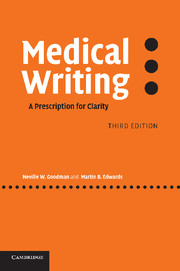Book contents
- Frontmatter
- Contents
- Preface to the first edition
- Preface to the third edition
- Acknowledgements
- PART I PROBLEM: THE ILLNESS
- PART II SOLUTION: SYMPTOMATIC RELIEF
- 3 Guidelines to clearer writing
- 4 Is there a better word?
- 5 Superfluous words
- 6 Imprecise words and phrases
- 7 Superfluous phrases
- 8 Trouble with short words
- 9 Use of the passive voice
- 10 Consistency: number and tenses
- 11 Circumlocution, metaphor and cliché
- 12 Word order and pronouns
- 13 Punctuation
- 14 Constructing sentences
- 15 Drawing clear graphs
- PART III PRACTICE: RECUPERATION
- Appendix: examples to rewrite
- References and further reading
- Index
5 - Superfluous words
Published online by Cambridge University Press: 23 November 2009
- Frontmatter
- Contents
- Preface to the first edition
- Preface to the third edition
- Acknowledgements
- PART I PROBLEM: THE ILLNESS
- PART II SOLUTION: SYMPTOMATIC RELIEF
- 3 Guidelines to clearer writing
- 4 Is there a better word?
- 5 Superfluous words
- 6 Imprecise words and phrases
- 7 Superfluous phrases
- 8 Trouble with short words
- 9 Use of the passive voice
- 10 Consistency: number and tenses
- 11 Circumlocution, metaphor and cliché
- 12 Word order and pronouns
- 13 Punctuation
- 14 Constructing sentences
- 15 Drawing clear graphs
- PART III PRACTICE: RECUPERATION
- Appendix: examples to rewrite
- References and further reading
- Index
Summary
Some common examples
Scientific writing in general, and medical writing in particular, is muddied by superfluous words. These masquerade as part of convention but are actually just catch-phrases or padding: the literary equivalent of clearing the throat. We select as common culprits basis, case, conditions, essentially, feature, function, grounds, instance, nature, situation, type, very. These sorts of word usually add nothing; they are words for words' sake. When you can recognize them as such, delete them and restructure the sentence.
BASIS
The patients were examined on a daily basis means that patients were examined daily.
Samples of blood were taken on a regular basis means that samples were taken regularly.
These adverbial phrases (on a daily basis, on a regular basis) can usually be replaced by the simple adverbs (daily, regularly).
It should be possible to perform 25% of all operations on a day case basis by the year…
There is no adverb day-casely, but why not as day cases? (And incidentally why not a quarter for ‘25%’?)
A one-to-one basis is a fashionable phrase; it means individual(ly).
BASICALLY, see ESSENTIALLY
CASE
Searching for case is worthwhile; it can almost always be replaced or deleted (see p. 126). It is correct usage in We report 13 cases of diabetes or Atropine should be available in case a bradycardia occurs, although Atropine should be available to correct any bradycardia is better.
It is too early to judge if this is the case or not.
Replace the case or not with so.
- Type
- Chapter
- Information
- Medical WritingA Prescription for Clarity, pp. 95 - 103Publisher: Cambridge University PressPrint publication year: 2006



